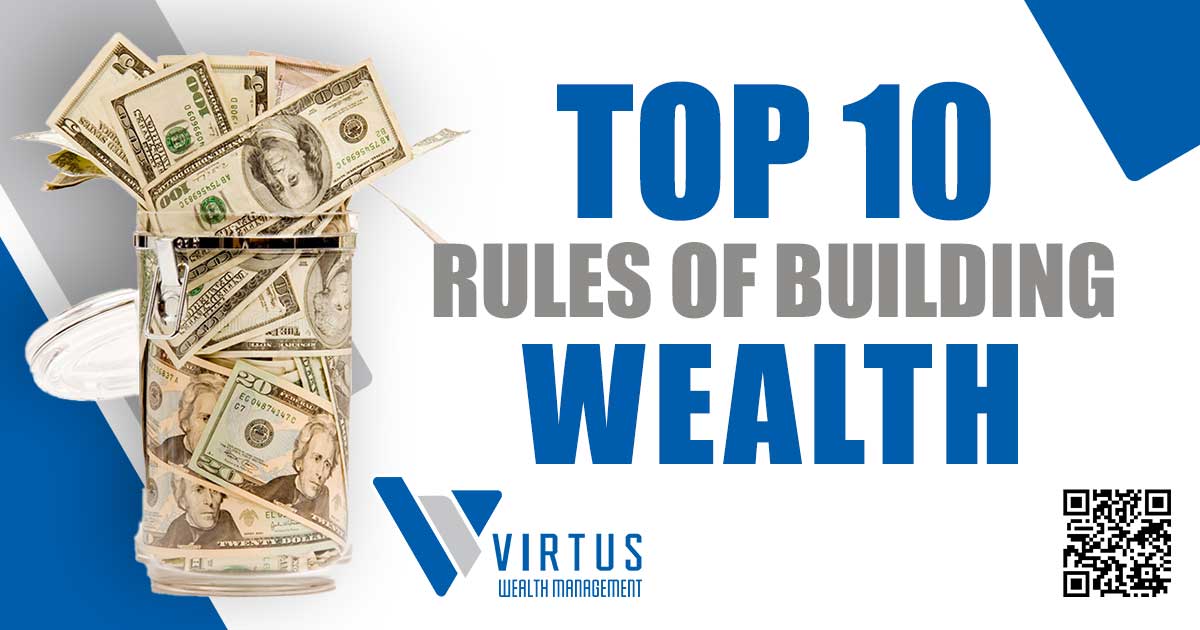I am sharing with you some of the information the Life Insurance Marketing and Research...


“We must all suffer from one of two pains: the pain of discipline or the pain of regret. The difference is discipline weighs ounces while regret weighs tons.” Jim Rohn
Truer words have never been spoken when it comes to building wealth and investing. Discipline is key. However, we must know and understand when and where we need to be disciplined. How we should be disciplined. What is or isn’t important. I decided to list my thoughts on the top 10 rules of building wealth to help those wondering how to do so and what discipline is needed.
One important point here. It doesn’t matter if you are starting with $1 or $10 million, all of these still apply.
Show me a company without a business plan and I will show you a doomed business. What does a business have to do with your wealth? Simple, you should treat your wealth as a business. You are Chief Executive Officer (CEO) of your brand and business. Have a plan!
But don’t let the tail wag the dog when it comes to fees. Net return is what is most important. Never lose focus on net return.
No matter what hot fad or bubble exists, they typically end ugly because investors start ignoring valuations. Investing hasn’t changed. It is the same as 100 years ago. Maybe there are some new models but the concept it simple. It really is no different than if you were to buy a private company. You want to make sure future earnings or dividends will exceed the amount of capital needed to buy the asset. Moral of the story, be careful chasing the hot shining toy in investing. Bubbles pop.
Diversification has proven to make the road less bumpy in investing without necessarily giving up long-term return. It does not make the road free of bumps. The issue is diversification might be the most misunderstood term in investing. Recency bias can also skew a lot of analysis. Even if one is 100% stock, diversification is prudent.
Recall rule #1, in which we state the importance of having a plan. Well that plan should lay out what kind of return you need to reach your goals. The issue isn’t risk but instead excess risk, greed, or fear-based investing. If you put a plan together and to reach all your goals you need a 6% return, why chase a 10% return other than greed? Chasing that 10% return might lead you to big losses that keep you from reaching your goals, especially if the big losses happen at the wrong time.
On the flip side, if you are very risk adverse and like having all your money in cash and CDs, fine except know it is losing wealth in inflationary periods. If your plan shows that you need a 6% return and you understand the downside risk, why be held back by a feeling? It is understandable to avoid the risk if the return is unreasonable like long-term double-digit returns.
Let your goals drive your decisions, within a reasonable range of returns. Try to separate emotions from investing and wealth accumulation.
It does irrespective of your age. Moreover, all of these, including educational savings for children, insurance, taxes, retirement plan, and your estate plan should all work together. Too often people do each of these in isolation, creating holes in the wealth planning. A Wealth Manager should help you make your money work efficiently for you.
A long-term view is a must unless one is a trader. Trading is for people who like to lose money, investing is for people who like to make money. Think and invest for the long-term.
I am confident stating the planning experience for most people has been incomplete, or even a complete waste. The person, with or without the help of an advisor, will put a plan together only to never look at it again. The entire focus will be on getting to retirement. What happens after? One of the most important parts of a plan is after retirement. Are you living a tax advantage retirement life? Who knows how high taxes rise in the future? Keeping an eye on taxes doesn’t end at retirement.
One of the hold ups for many people doing plans is they don’t know all the answers, such as when they will retire, how much they will need once they retire, etc. A good plan works in ranges and is fluid. It is supposed to change. Just get started. Think of it as your ideal and your acceptable retirements. Your ideal retirement might be 55 and acceptable 60. Just get started so you can you have direction.
Maybe the most important rule to learn early. If something is expected to achieve a higher return, it has higher risk. The higher the return, the higher the potential loss. It is an investment absolute truth that has been around for centuries. All of the scams on wall street that could have been avoided if people knew that if someone is promising a higher return but saying it is risk free, run as far away from them as possible. If the risk-free rate (U.S. Treasury) is 1% and someone is telling you they can get you an 8% risk free return, warning bells should be screaming in your ears. Run! At least come talk to me before you bite.
Wealth building is not a short-term-get-rich-quick scheme. It is a disciplined process that starts with just a simple step.
“If you don’t know where you are going, you’ll end up somewhere else.” Yogi Berra.
The opinions voiced are for general information only and are not intended to provide specific advice or recommendations for any individual.
There is no guarantee that a diversified portfolio will enhance overall returns or outperform a non-diversified portfolio.
Diversification does not protect against market risk.
All investing includes risks, including fluctuating prices and loss of principal.